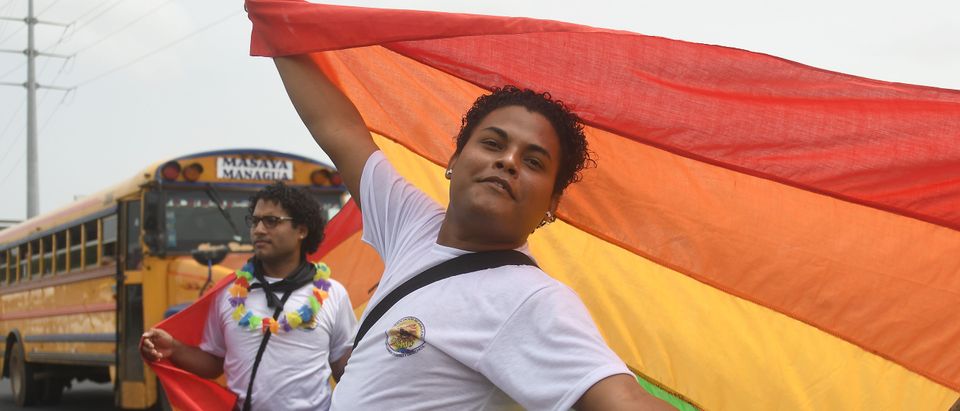People with intersex conditions are a tiny fraction of the population, but suddenly, they are everywhere in the media.
They’ve become poster children for liberals incensed at a Trump administration proposal to restore the meaning of “sex” in Title IX to its original 1972 definition — namely, biological sex. The Obama administration had unilaterally changed the definition of “sex” to include sexual orientation and gender identity (SOGI).
The suggestion that we return to the pre-Obama definition has triggered an avalanche of outrage insisting there is no biological male-female binary — that sex is a spectrum.
To press their point, liberals are parading out intersex people.
The New York Times led with a tirade titled, “Why Sex Is Not Binary.” It brandished intersex persons as weapons in the culture war, insisting “there is no single biological measure that unassailably places each and every human into one of two categories — male or female.”
The Washington Post trotted out intersex people to declare “natal biological sex is not binary … The distinction between male and female is blurry.”
The Verge exploited the existence of intersex to argue for “the whole of biological ‘sex’ to be viewed as a spectrum.”
Teen Vogue used intersex persons to tell teens we must stop “assuming gender based on genitals.”
This concerted media strategy is not only unscientific; it is also heartlessly unfair to actual intersex persons.
In culture-war rhetoric, intersex persons are often co-opted into the SOGI camp. But the two groups are not the same. Intersex is a physical condition. Less than 1 percent of people are born with genitals that are atypical or ambiguous due to genetic and hormonal anomalies.
By contrast, people who identify as homosexual or transgender have a psychological condition. They are clearly biologically male or female at birth. They have typical sex markers (e.g., genetics, gonads, genitals) that all align with each other. As cardiologist Paula Johnson says in a popular TED talk, “Every cell in the human body has a sex.”
For their part, most intersex people are not seeking to advance the SOGI agenda. Neither are they clamoring to eliminate the sexual binary.
The Intersex Society of North America says, “Intersex people are perfectly comfortable adopting either a male or female gender identity” using hormones and surgery. They “not seeking a genderless society or to label themselves as a member of a third gender class.”
As an intersex woman said to me, “How do you think it feels being a pawn in someone else’s game? It hurts to be shoved into the LGBT camp by either side.”
What about the endlessly repeated mantra that sex is a spectrum? Not so. When more than 99 percent of the members of a species are clearly male or female, it is scientifically correct to say sexuality is a dichotomy, not a continuum.
There are only two gametes: sperm and egg. There is no spectrum in between.
Moreover, intersex syndromes are not merely neutral variations. The medical terminology is “disorder of sex development” because most or all intersex syndromes impair sexual and reproductive function. Some can even be fatal.
Congenital Adrenal Hyperplasia is an enzyme deficiency condition that causes a malfunction of the fetus’s adrenal gland, which can cause severe dehydration leading to the newborn’s death.
By analogy, if I have a heart condition that impairs its function, the cardiologist does not say, “Well, hearts exist on a spectrum and yours is just … different.” No, he says let’s see if we can improve its function.
In rare cases, intersex conditions are not known until sometime after birth, or physicians make a mistake in deciding whether a newborn should be raised male or female.
Today, there is a push to let the child mature longer before performing surgery in order to make a more accurate assessment. In these cases, individuals should be allowed to change their birth certificate based on objective medical facts.
Tragically, individuals with intersex conditions often experience shame and embarrassment. We should work to make them feel welcome in our homes, neighborhoods, churches, and workplaces.
All humans are beset by breakdowns in the genetic code: mutations, deletions, and copying errors. As a result, we all suffer deficiencies and malfunctions — a weak heart, a proneness to depression, a tendency to high blood pressure. Those who suffer disorders in the reproductive system are like the rest of us. They should be treated with empathy and respect.
They should not be callously exploited as pawns in the game of advancing a radical political agenda.
Nancy Pearcey is professor and scholar in residence at Houston Baptist University and editor-at-large of the Pearcey Report. Her latest book is Love Thy Body: Answering Hard Questions about Life and Sexuality.
The views and opinions expressed in this commentary are those of the author and do not reflect the official position of The Daily Caller.


